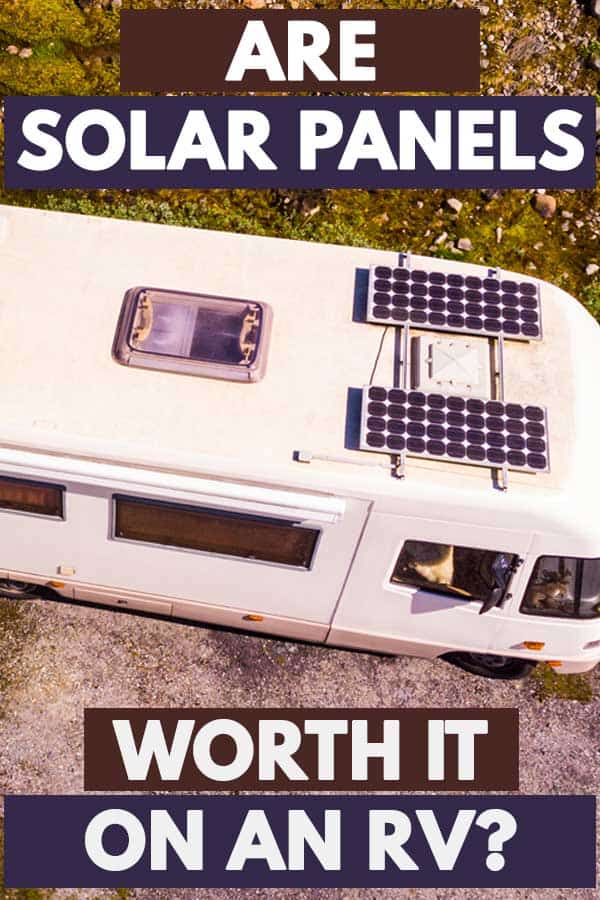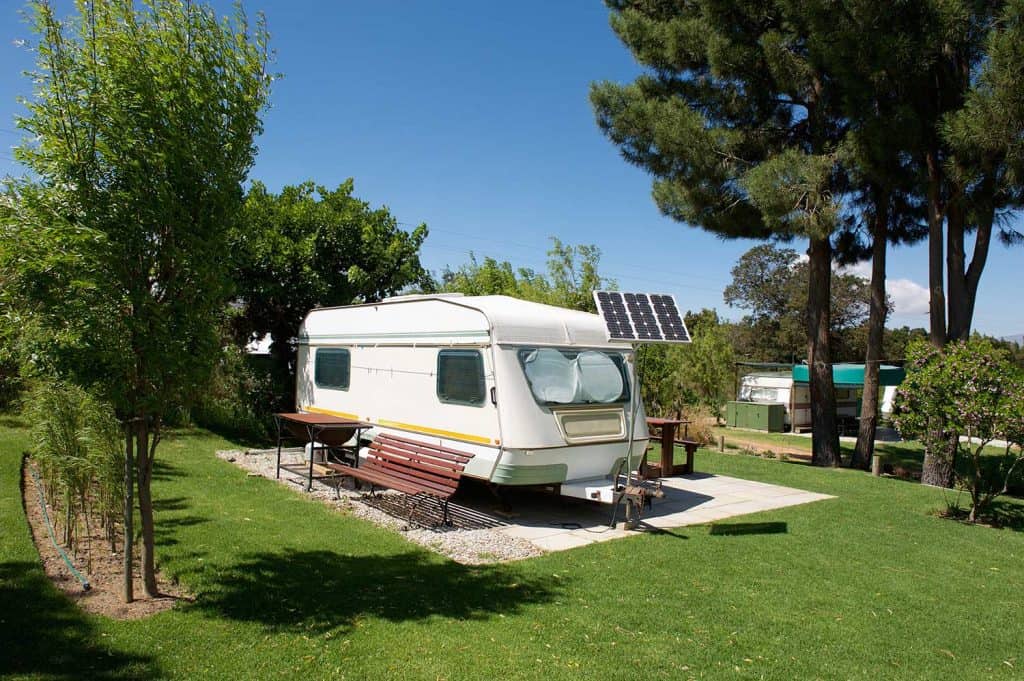 If you’re an RV owner, then it’s no secret that electricity is hard to come by when on the road. Sure, you can rely on power at a campsite or park, but what about when you’re not staying there? You’ve heard solar panels could be a viable solution, but you’re not totally sold. Are solar panels worth it on an RV? We did some digging to provide you the answer.
If you’re an RV owner, then it’s no secret that electricity is hard to come by when on the road. Sure, you can rely on power at a campsite or park, but what about when you’re not staying there? You’ve heard solar panels could be a viable solution, but you’re not totally sold. Are solar panels worth it on an RV? We did some digging to provide you the answer.
It’s worth considering solar panels on an RV if you boondock often. Even if you don’t, having a reliable source of power is always nice. Of course, there are reasons against RV solar panels, as these can cost anywhere from $500 to $2,000 for a kit.
In this article, we will tell you everything you need to know about RV solar panels. First, we’ll explain how they work. Then, we’ll talk more about the price. By the time you've finished reading, you can answer the question of whether you think it’s worth it to have solar panels on your RV.
How Do RV Solar Panels Work?
The goal of this article is to assess whether it’s worth it to consider RV solar panels for your vehicle. As part of that, we should begin with an explanation of how these solar panels work.
An RV solar panel system has several components. It’s not just the panels, even if they play an integral part. There’s also a charge controller, a battery system that generates direct current or DC power, and an inverter that makes alternate current or AC power.
Your solar panels get installed on your RV’s roof, sort of like how if you had solar panels at home, they’d go on the roof of the house. Rays of sunlight stream down to the solar panels. When this happens, it generates an electrical current.
That current travels to the charge controller. As the name tells you, a charge controller dictates the quantity of current the battery receives. As we mentioned, that battery produces DC power. If you need AC power instead, the inverter can transfer it. You can then use such items on your RV as your phone charger, your computer, or even a blender.
Besides acting as a source of electricity, RV solar panels can also charge your vehicle’s battery. Granted, this happens slowly, but it does happen. The natural charging of RV batteries through solar power is better for them than other charging methods. Thus, you get a healthier battery with a good lifespan.
How Much Power Do You Get, Anyway?
Okay, so let’s say you did choose to buy RV solar panels. How much power can they generate? Is it anything worthwhile?
Yes, it is. These solar panel systems come at different wattages. If you had a system with 400 watts and it worked for five daily hours, that would give you 2,000 watts of power to work with. That’s not too shabby.
Of course, we have to be realistic. Your solar panel system won’t run at peak efficiency every day. Getting five consistent hours of sunlight can be difficult depending on where you are, so you don’t quite get those 2,000 watts. You’ll end up with something close, though. The solar panels do still work in cloudy weather, but not as well as they do in direct sunlight.
If you only ride in your RV on short jaunts, you should be able to get by for a few days with about 2,000 watts. Those who travel much more frequently will need a bigger system. Maybe one with 800 watts will work better for you. This has the potential to generate 4,000 watts of power. You could use most RV appliances with that much juice, no problem.
Now, the more wattage you get, the more panels your RV requires, so keep that in mind.
How Much Does It Cost to Add Solar Panels to an RV?
You’re certainly intrigued by RV solar panels. You might even be contemplating getting a set for your own motorhome. Before you make up your mind, though, you have to know about the costs of these panels.
Here is an overview of some solar panel systems and their costs. We also included how many panels there are, whether you get an inverter and the type of charge controller.
- Eco-Worthy’s Weekender ISW Solar Charging System at 160 watts with a 45-amp PWM controller and no inverter: $575
- WindyNation’s solar panel kit at 200 watts with a 30-amp P30L controller and a 1,500-watt VertaMax inverter: $505
- Wholesale Solar’s Sunrise RV Kit at 100 watts with a 30-amp Morningstar controller and no inverter: $608
- Renogy’s Monocrystalline Solar RV Kit at 200 watts with a 30-amp Renogy Adventurer controller and no inverter: $150
- Zamp Solar’s Deluxe RV Solar Kit at 480 watts with a 30-amp Zamp controller and no inverter: $2,000
Where Can You Get RV Solar Panels?
Besides the above products, you can also buy individual solar panels or sets for your RV. This lets you control both the wattage and the budget. Here are some of our top picks.
Mighty Max Off-Grid Solar Panels
One solar panel solution you might use comes from Mighty Max. Their 100-watt solar panels include pre-drilled holes so you can get the panels up and running faster. They also have a frame made of aluminum that can handle snow and strong winds.
ACOPOWER 100-Watt Portable Solar Panels
As an Amazon’s Choice product, we had to include this solar panel set from ACOPOWER. It has its own charge controller that comes installed with it. Waterproof, the solar panels include an Anderson plug and MC4 connectors that will make setup easy-peasy.
How Long Do RV Solar Panels Last?
Curious about the longevity of RV solar panels? Of course, you are. RV resource Money Saving RV Repair mentions that you could have your solar panels between 20 and 40 years. You do have to maintain the quality to get that many good years out of them, though.
You’ll want to keep the solar panels clean so they can work as well as possible. Dust, dirt, and other debris can accumulate if you don’t clean the roof of your RV regularly. While you’re up there, give the solar panel mounting brackets a once-over, tightening them if necessary. If your panels have caulk around them, you might want to apply a fresh layer as well.
Conclusion
RV solar panels provide electricity to your vehicle from the sun’s energy. They’re a renewable resource that’s good for the environment. You can also use your solar panels to recharge your RV’s battery.
It’s not all wonderful. As we mentioned, some kits can cost thousands of dollars. You might also not get to peak wattage depending on the weather. With their versatility and different price points, though, we say you have nothing to lose by giving RV solar panels a chance.



